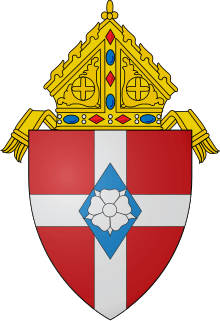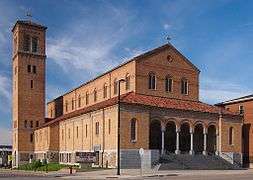George Henry Speltz
George Henry Speltz (May 29, 1912 – February 1, 2004) was an American prelate of the Catholic Church. He served as Auxiliary Bishop of Winona (1963–66) and Bishop of St. Cloud (1968–87).
Most Reverend George Henry Speltz | |
|---|---|
| Bishop of St. Cloud | |
| See | St. Cloud |
| Installed | January 31, 1968 |
| Term ended | January 13, 1987 |
| Predecessor | Peter William Bartholome |
| Successor | Jerome Hanus |
| Other posts | Auxiliary Bishop of Winona (1963–66) Coadjutor Bishop of St. Cloud (1966–68) |
| Orders | |
| Ordination | June 2, 1940 |
| Consecration | March 25, 1963 |
| Personal details | |
| Born | May 29, 1912 Altura, Minnesota |
| Died | February 1, 2004 (aged 91) St. Cloud, Minnesota |
| Denomination | Catholic Church |
Biography
George Speltz was born in Altura, Minnesota, one of seven children of Henry and Josephine (née Jung) Speltz.[1] He attended Holy Trinity High School in Rollingstone, and then studied at St. Mary's College in Winona, where he earned a Bachelor of Science degree in 1932.[2] He continued his studies at St. Paul Seminary in St. Paul.[3]
Speltz was ordained to the priesthood by Bishop Francis Kelly on June 2, 1940.[4] He then served as assistant pastor of St. John's Church and superintendent of Loretto High School in Caledonia until 1941.[1] In 1944, he earned a Doctor of Philosophy degree in economics from the Catholic University of America in Washington, D.C.[2] His thesis was entitled: "Decentralization and the Social Obligations of the Land".[5]
Returning to Minnesota, Speltz served as vice-chancellor of the Diocese of Winona (1944–47) and superintendent of diocesan schools (1945–49).[3] In 1946, he was named pastor of St. Mary's Church in Minneiska and a professor at St. Mary's College in Winona.[1] He served as the first rector of Immaculate Heart of Mary Seminary in Winona from 1948 to 1963.[3]
On February 12, 1963, Speltz was appointed Auxiliary Bishop of Winona and Titular Bishop of Claneus by Pope John XXIII.[4] He received his episcopal consecration on the following March 25 from Bishop Edward Fitzgerald, with Bishops Peter Bartholome and Frederick Freking serving as co-consecrators, at the Cathedral of the Sacred Heart.[4] In addition to his episcopal duties, he served as pastor of St. Mary's Church in Winona from 1963 to 1966.[1] He also attended the last three sessions of the Second Vatican Council (1963–65).[6]
On April 6, 1966, Speltz was appointed Coadjutor Bishop of the Diocese of St. Cloud by Pope Paul VI.[4] His installation took place on the following June 7. He succeeded Bishop Peter Bartholome as the sixth Bishop of St. Cloud on January 31, 1968.[4] He was president of the National Catholic Rural Life Conference from 1970 to 1972.[3] In 1984, he initiated a ban to deny church weddings to couples who live together before they marry, unless they agreed to live apart before their wedding; he said cohabitation "calls into question fundamental moral values that have long been central to the Christian tradition: the sacred character of sex and of the Christian family."[7] He retired as Bishop of St. Cloud due to health concerns on January 13, 1987.[4]
Speltz died at St. Benedict Senior Community in St. Cloud, at age 91.[2] He is buried at Assumption Cemetery in St. Cloud.[8]
Notes
- Who's Who in the Midwest, 1982-1983. Marquis Who's Who. 1982.
- "Bishop Speltz, retired head of St. Cloud Diocese, dies at 91". The Georgia Bulletin. 2004-02-03. Archived from the original on 2008-12-01.
- "Former Bishop George Speltz leaves behind lengthy legacy" (PDF). Saint Mary's University Magazine. Spring 2004.
- "Bishop George Henry Speltz". Catholic-Hierarchy.org.
- Vecsey, George (1979-08-04). "Catholic groups campaign to save the 'family farm'". St. Petersburg Times.
- Sawyer Allen, Martha (1986-03-16). "At 73, Bishop Speltz looks back at pain caused by change and principles". Star Tribune.
- "GEORGE SPELTZ WAS BISHOP OF ST. CLOUD DIOCESE". St. Paul Pioneer Press. 2004-02-04.
- "Rev George Henry Speltz". Find A Grave.

